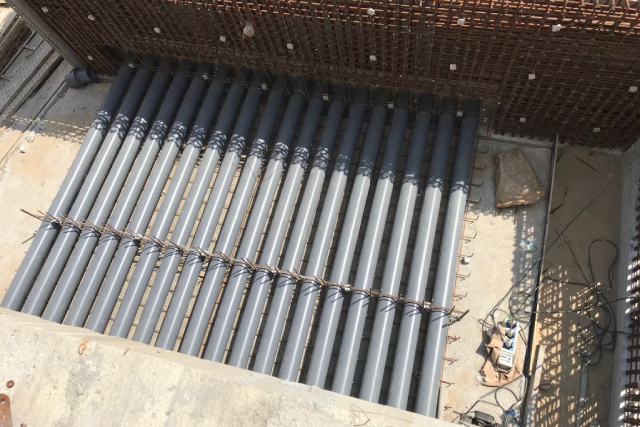
27 Jun Rainwater vs Sanitary Drainage: A Look at How They Differ
Waste removal is indispensable in all types of property, be it in a commercial business establishment or a residential home. Underground drainage is responsible for this essential part of any structure, which prevents water and waste from accumulating to ensure no harm befalls the property and to preserve public safety.
The two plumbing systems under this underground drainage category are rainwater drains and sanitary sewers. Since these two systems serve widely different purposes, knowing how they differ helps guide your choice of piping materials when building them. Read on below to learn what separates rainwater and sanitary drains and why UPVC pipes can work for both.
What is a Rainwater Drain?
Rain drainage structures are essential in preventing disasters like flooding and can range in design from complex municipal drains to simple residential drainage. Their main purpose is to swiftly remove gallons upon gallons of rain and groundwater before they can accumulate. Rainwater sewers are typically found in basement floors, roadside curbs, and alleys where rainwater tends to pool.
Since rainwater simply runs off most man-made surfaces like roofs, sidewalks, and paved streets, underground rainwater plumbing diverts them elsewhere with the help of curb inlets or openings up on the surface. And when water flows downward towards these drains, it inevitably picks up many things along the way, such as loose soil and debris.
The biggest difference between rainwater drains and sanitary sewers lies in that the former does not filter out or treat the water that passes through. The captured rainwater, along with any pollutants, simply flows out and gets released directly into open bodies of water.
What is a Sanitary Drainage?
Sanitary drainage is a set of plumbing that carries wastewater from bathrooms, appliances, and other related fixtures to wastewater treatment systems or waste disposal holding tanks. This sewerage and soil pipe system must be designed without any leaks or spills, enabling a seamless flow of water and preventing potential problems such as clogs, backflow, or pressure fluctuations.
Once the wastewater reaches the local treatment plant, it undergoes a complex purification process before being safely discharged into nearby bodies of water. This intricate cleaning procedure plays a vital role in upholding a safe and pristine environment within both industrial and residential structures.
What Makes UPVC a Great Choice for Both Plumbing Works?
When it comes to civil engineering projects involving underground pipes, SS272 Unplasticised Polyvinyl Chloride (UPVC) stands out as one of the top material choices. These pipes efficiently transport rainwater, sewage, and other waste fluids. With their exceptional durability and resistance to corrosion, SS272 UPVC pipes are highly suitable for such applications.
Furthermore, SS141 UPVC pipes in Singapore find diverse applications beyond civil engineering. They are commonly utilised in hydroponic systems and ensure safe and reliable transportation of drinking water.
Some of the key features that make UPVC pipes a perfect fit for plumbing works are:
- Incredible Durability
There are specific types of plastic pipes designed for various applications. For example, SS272 pipes are specialised for underground use, SS213 pipes are intended for rainwater downpipes, and SS141 UPVC pipes are specifically designed for irrigation and hydroponics.
The durability of these pipes is crucial due to their constant exposure to moisture and the potential for unintended impacts. This toughness ensures that the pipes can withstand such conditions and continue to perform reliably.
- High Corrosion Resistance
Physical impacts from other construction works are not the only thing that can damage an underground plumbing installation. The waste materials travelling through the pipes can also cause corrosion from the inside over time. Thankfully, UPVC pipes also have excellent chemical resistance that prevents this, ensuring a leak-free performance for years to come.
- Smooth Wall Interiors
UPVC pipes have smooth interior walls allowing an uninterrupted flow of waste materials. This perfect finish prevents the build-up of debris, waste particles, and other solids that could clog the system and cut off the flow.
Conclusion
Rainwater and sanitary sewers serve distinct purposes despite being both underground drainage systems. This difference also applies to the volume of material they transport and how they drain it from buildings. By learning what sets the two apart, it becomes easier to choose the right plumbing solutions for the job.
If your project demands sustainable and sturdy underground drainage pipes and fittings, or if you’re looking to buy a hydroponic system in Singapore, Vicplas is the brand you can trust. Our BCA-SGBC Green Mark recognised piping products cover a wide range of uses, from hydroponic agriculture and electrical works to rainwater downpipes and more. For more details about our ISO-certified UPVC pipes and fittings, don’t hesitate to contact us today.
